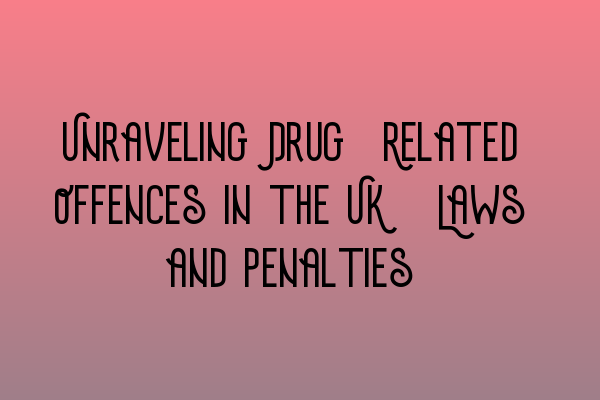Unraveling Drug-Related Offences in the UK: Laws and Penalties
As a solicitor specializing in criminal law and practice, I understand the complexities and seriousness of drug-related offences in the United Kingdom. In recent years, the UK has witnessed an increase in drug-related criminal activities, prompting stringent laws and harsh penalties to combat the issue. In this blog post, we will dive into the various aspects of drug-related offences, including the laws surrounding them and the penalties imposed upon those convicted.
**Understanding Drug-Related Offences**
Drug-related offences encompass a broad range of activities, including possession, cultivation, production, supply, and trafficking of controlled substances. The Misuse of Drugs Act 1971 is the principal legislation in the UK that governs drug-related offences. This Act classifies drugs into categories known as “class A,” “class B,” and “class C” based on their harmfulness and potential for misuse.
**Drug Classification and Penalties**
Each class of controlled substances carries different penalties upon conviction. Let’s delve into each class and the associated penalties:
1. **Class A Drugs:** Class A drugs are considered the most harmful and attract the harshest penalties. This category includes substances like cocaine, heroin, ecstasy, and LSD. Possession of a class A drug can lead to up to seven years of imprisonment, an unlimited fine, or both. Additionally, the supply, production, or intent to supply class A drugs can result in life imprisonment, an unlimited fine, or both.
2. **Class B Drugs:** The category of class B drugs includes substances like cannabis, amphetamines, and ketamine. Possessing a class B drug can lead to up to five years of imprisonment, an unlimited fine, or both. Similarly, supplying, producing, or intending to supply class B drugs can result in up to 14 years of imprisonment, an unlimited fine, or both.
3. **Class C Drugs:** Class C drugs, such as anabolic steroids, GHB, and certain tranquillizers, carry lesser penalties compared to class A and class B drugs. Possession of a class C drug can lead to up to two years of imprisonment, an unlimited fine, or both. Supplying, producing, or intending to supply class C drugs can result in up to 14 years of imprisonment, an unlimited fine, or both.
**Aggravating Factors and Sentencing**
Several factors can impact the severity of penalties for drug-related offences. Aggravating factors, including the quantity of drugs involved, the presence of weapons, and involvement with organized criminal groups, can intensify the charges and sentences imposed by the court. It is important to note that drug offences committed near schools or involving minors may attract particularly harsh penalties, as the law aims to protect vulnerable populations.
When determining the appropriate sentence, the court takes into account the offender’s role in the offence, any previous convictions, and the circumstances surrounding the case. Mitigating factors, such as cooperation with authorities, genuine remorse, and evidence of rehabilitation, may help reduce the severity of the penalty.
**Alternative Sentences and Rehabilitation**
In some cases, the court may opt for alternative sentencing options instead of immediate imprisonment. These alternatives aim to address underlying issues that contribute to drug-related offences while rehabilitating the individual. Drug Rehabilitation Requirements (DRRs), Drug Treatment and Testing Orders (DTTOs), and suspended sentences with mandatory drug rehabilitation programs are some of the alternatives available to the court.
These alternative sentencing options focus on providing support and treatment for drug addiction, helping offenders break free from the cycle of drug-related offences. By addressing the root cause, they aim to prevent further criminal activities and promote successful reintegration into society.
**Conclusion**
Drug-related offences in the UK are taken seriously, with stringent laws and penalties in place to deter drug-related activities. Understanding the classification of drugs, associated penalties, and potential aggravating factors is crucial for individuals facing drug-related charges. If you or someone you know is caught in the web of drug-related offences, seeking legal guidance from an experienced criminal law solicitor is essential.
At SQE Criminal Law & Practice Law UK, we specialize in handling drug-related offences and providing representation throughout the legal process. Our team of dedicated solicitors possesses the expertise and knowledge to anticipate the strategies employed by the prosecution and mount a strong defense on your behalf. Don’t hesitate to reach out to us for professional advice and support when facing drug-related charges in the UK.
Note: This blog post is for informational purposes only and should not be considered legal advice. Always consult with a qualified solicitor for personalized guidance based on your specific circumstances.
